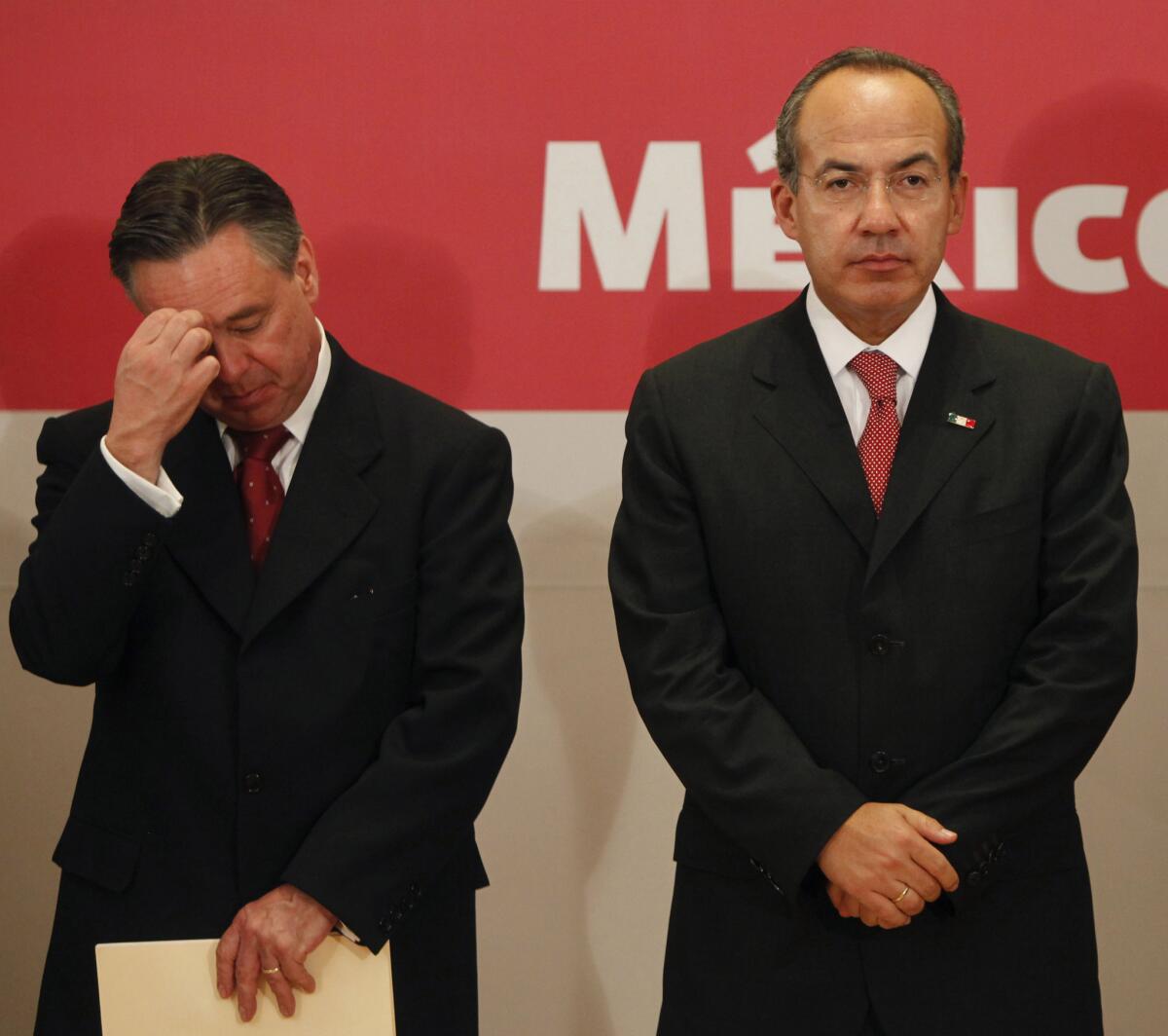Ambassador’s nomination to Mexican Supreme Court proves controversial

- Share via
Reporting from Mexico City — Possibly not since Clarence Thomas was nominated for the U.S. Supreme Court in 1991 has a high court candidate been so controversial.
In this case, we are talking about Mexico. And the nominee to the Mexican Supreme Court is the ambassador to the United States, Eduardo Medina Mora.
The joke in Mexico is that Medina Mora “fails upward.” He has been associated with a string of disasters, yet his career advances.
Medina Mora, who has close professional and personal ties to President Enrique Peña Nieto, served as head of the domestic intelligence agency -- roughly equivalent to the United States’ National Security Agency -- under the lackluster government of President Vicente Fox.
Then he was attorney general, the top legal official at a time when Mexico was plunging into a war on drug cartels that has cost tens of thousands of lives.
From there, he became ambassador to London, followed by his current seat in Washington, the two considered to be the plums of Mexican diplomatic posts.
“I have a very broad experience,” he said this week in congressional hearings to defend his nomination.
Medina Mora has survived governments of different political stripes. And his enemies are many, as witnessed by a slew of commentaries, articles and tough congressional questionings tilted against his nomination.
Under Mexican law, the president nominates three people to fill a single spot on the Supreme Court, vacant this time after the death in December of Justice Sergio Valls Hernandez. The Senate then picks one of the three to join the 11-member court for a 15-year term.
“A man who was in charge of intelligence agencies, named as a candidate to the Supreme Court.... Unimaginable … in any democracy, yet normal here,” columnist Jesus Silva-Herzog Marquez lamented.
“Medina Mora’s [drug] war was not only a failure for security, it was a catastrophe for human rights,” Silva-Herzog said. “Medina Mora cannot exactly be remembered for his efficiency nor for his respect of the rules.”
He has been attacked for everything from, as attorney general, trying to overturn a law legalizing abortion in Mexico City (he acknowledged), to possible knowledge of the notorious “Fast and Furious” program, in which the United States allowed drug traffickers to infiltrate high-powered weapons into Mexico as part of a gone-wrong sting (he denied).
As ambassador in London, he is best remembered for taking the BBC TV program “Top Gear” to task for joking insults aimed at Mexican drivers.
And he is said to have been instrumental in obliging Britain’s Guardian newspaper to publish a semi-apology for articles about the over-influential role of the giant Mexican broadcaster Televisa in the 2012 election of Peña Nieto.
His tenure in Washington has been fairly low key but impressive to many observers in the U.S. capital.
Michael Shifter, president of the Washington-based Inter-American Dialogue, which invited Medina Mora to several conferences, said the ambassador had a “good antenna” for issues of importance to the U.S.
“Every issue, organized crime, trade, human rights, security … he had a command of them and knew how to talk about them,” Shifter said.
Even in the hypersensitive matter of immigration reform, Shifter said, Medina Mora was the ultimate diplomat, expressing, without pushing, Mexico’s position in support of President Obama’s executive actions that would allow several million Mexican citizens to remain legally in the U.S.
“He understood that if you went too far, it would undermine immigration reform,” Shifter said.
Medina Mora went before Mexican lawmakers this week to testify about his qualifications and possible conflicts of interest. So pressed was he on ties to Peña Nieto that at one point he testified that he and the president were not the godfathers to each other’s children, a particularly cherished relationship.
The Senate is expected to vote on the nomination in the next few days.
Cecilia Sanchez of The Times’ Mexico City bureau contributed to this report.
For more news out of Mexico and Latin America, follow @TracyKWilkinson.
More to Read
Sign up for Essential California
The most important California stories and recommendations in your inbox every morning.
You may occasionally receive promotional content from the Los Angeles Times.











